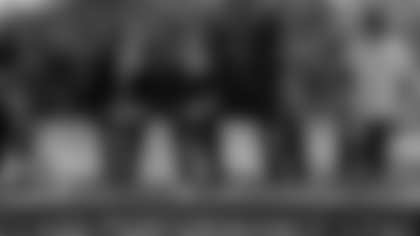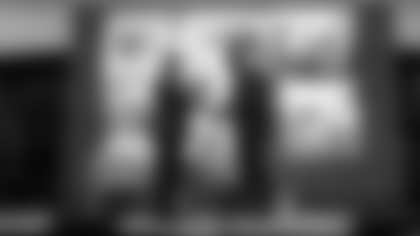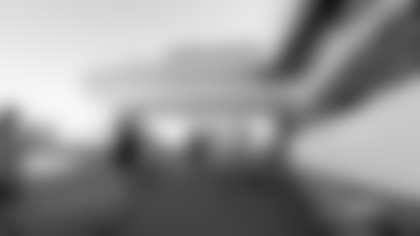Rookie Padric Scott (right) talks with fellow defensive tackle Dan Williams during minicamp. The two could pass for twin brothers.
By now, Padric Scott is used to getting the look.
It's the one he got when he stepped into an Advanced Placement classroom at Lincoln High School in Tallahassee, Fla., or when he'd get off the bus for a math competition.
It's the one that came across teenagers' faces when they assumed a football player couldn't handle the rigors of a high-level science class.
"I think it's funny because you get labeled so easy," said Scott, a rookie defensive tackle. "It was actually funny in high school because I remember walking into class and they're like, 'What is he doing here?'
"Almost like you don't belong. I like to destroy those stereotypes."
He didn't just destroy those stereotypes with a 4.56 GPA in high school and then graduating Cum Laude from Florida A&M University. He obliterated them.
Now Padric – a noble version of Patrick but pronounced as it's spelled – gets a look for another reason, but this time it's one of confusion accented with a slight head tilt.
"I can't go anywhere without somebody calling me Dan Williams," said Scott, referring to his teammate to whom Scott bears an eerie resemblance. "Everywhere I go in Arizona, I'm Dan Williams. It's a compliment.
"I think I look better, personally."
Even Scott's mother got the two confused after watching a video – which was shot before the rookies even arrived in Arizona.
While all 309 pounds stacked on to Scott's 6-foot frame screamed football player, his vocabulary and his encyclopedic knowledge of science confused a lot of people.
"You know they're automatically going to assume, 'He's big, he doesn't know anything. He plays football,'" Scott said. "And then you open your mouth and have a conversation and you start dropping words that they don't even know or you carry on conversations about topics they didn't think you could. Then it's like I can start throwing out anatomical terms about dissections, and they're like, 'OK, this guy knows what he's talking about.'
"I love it. I have a straight face on, but in the back of my head I'm like yeah, 'I know you thought I was dumb. It's OK.'"
The brains came before the brawn, however.
Scott was raised by his father, Dr. Edward Scott II, a dentist who graduated in the Top 3 percent from Harvard's dental school, and his mother, Pamela, a math teacher with two master's degrees. Science is in Scott's genes. His sister, Dr. Kanesha Scott, majored in biology in college and is now a dentist. His brother, Edward Scott III, majored in chemistry and now works with computers.
But school always came before sports in the Scott household. Pamela once warned Padric, her youngest son, that if he received a B on his report card, he couldn't play football. But the three Scott children were taught young that hard work could reap benefits. Edward and Pamela devised a system that rewarded their children for high marks. They would pay their children for As depending on what grade they were in. So if Padric received three As in 10th grade, his parents gave him $30, and so on it went.
"It got to the point where you wanted to do good because you knew it would set yourself up," Scott said. "That's something they instilled in us at a very young age."
Science always clicked for Scott, who became enamored with dissections after attending a college-level physiology and anatomy summer program at Florida State University while he was in middle school. In high school, he found a love for blowing up his science experiments.
During a chemistry class his freshman year of high school, his lab group "made this pure form of oxygen," Scott said. His teacher walked over and said, "I'm going to let you do what you always want to do, guys." And then they blew up the oxygen.
While science classes were coming easy to Scott, football wasn't.
He began his freshman season as a defensive lineman but moved to the offensive line as a sophomore, where he stayed until he graduated. While his teammates grew and started receiving attention from colleges, Scott remained a 6-foot offensive lineman – the reason, he's convinced, that he wasn't recruited more.
"That really ain't happening," he joked.
But the college coaches who watched Scott saw an athleticism and agility that could transfer to any position. Scott attended Stanford University his freshman year, joining current Cardinals tight end Jim Dray on the roster, and moved back to the defensive line.
Even at one of the most prestigious institutions in America, Scott found school to be easy. He waited until 6 a.m. the day a year-long assignment was due to begin writing the 15-page paper. Even after a midday nap, he submitted it on time and received an A.
But the West Coast wasn't the right fit for Scott. He didn't attend church at all that year, opting for group breakfasts instead. Growing up preaching to congregants at his father's church, Mt. Zion AME, since he was 13, Scott missed it.
"I just knew I was part of an environment I didn't like so I just came back home," he said.
Because he redshirted his freshman year at Stanford, Scott was eligible to play at FAMU immediately as a sophomore. Armed with a new mindset, Scott finished four years of classes in three while majoring in molecular cell biology. To him, that year in Palo Alto was an awakening. He had strayed away from his religious beliefs far enough and he got a lot out of his system.
After returning to Tallahassee, Scott heard the doubters who thought he'd party college away or would fall off the wagon. It burned. And it drove him.
Scott began writing down all the negative things he heard or read. The list still hangs in his parents' home in Florida.
"That makes me more hungry," Scott said. "If I'm under 500 pounds about to bench it, I can just snap to it. If I ever feel like I'm too tired, I can snap to it."
During his junior pro day – the same year he finished his undergraduate degree – Scott ran the 40-yard dash in 5 seconds. Three-hundred-and-twenty-pounds ran 40 yards in 5 seconds. Even Scott couldn't believe it. And that's when the NFL became a reality.
He stayed in college for one more season, finishing his bachelor's at FAMU while starting graduate school. It's a common feat these days for college football players to work on their master's while exhausting their eligibility. But most don't study molecular biology. Taking classes such as genetics and gene manipulation, Scott finished his senior year with a 3.8 GPA.
"I had seen (molecular biology) for four years so it was like, OK, just taking it up a notch," he said. "It was easy to keep my grades up."
Although he wasn't drafted, Scott was the only defensive lineman the Cardinals signed as a free agent. He put down his text books and picked up his playbook.
Scott, who reads a chapter from his Bible every morning, said he has a photographic memory, which has helped him take plays he sees on film and relate them on the field. During rookie minicamp, he'd study the next days plays so he was familiar with them before they were introduced. It helped him not record as many mental errors as his rookie teammates.
"I think I studied my playbook more this summer than I've studied or picked up a book the past four years," Scott said with a deep laugh.
Scott is taking a break from the world of molecular biology for a while, or so he hopes. After his NFL career is over, he'll head back to school to get a joint M.D./Ph.D. degree so he can either open a research lab or become an orthopedic surgeon.
His father and sister have lobbied him to become a dentist. But Scott thinks he's too big.
"People are already scared of the dentist and then they walk in and see this big, massive behemoth ex-NFL player," he said. "They might not be OK with that."
It won't be the first time Scott's been judged. And it won't be the last time someone has been wrong.














